新人教版八年级下册英语重点短语句型
英语八下人教版重点语法

英语八下人教版重点语法
英语八下人教版的重点语法包括:
1.过去完成时(Past Perfect Tense):用来表示在过去某个时间或动作之前已经发生或完成的动作。
例如:I had already
finished my homework before my mom came back.
2.时间状语从句(Time clauses):用来表示时间关系的从句,一般以when,as soon as,until,before,after等引导。
例如:We will go to the park when it stops raining.
3.条件状语从句(Conditional clauses):用来表示假设条件的从句,一般以if引导。
例如:If it rains tomorrow, we will stay at home.
4.动词不定式(Infinitives):用来表示目的、原因、建议等。
例如:I went to the store to buy some groceries.
5.被动语态(Passive voice):用来强调动作的承受者而不是执行者。
例如:The cake was made by my mom.
6.定语从句(Relative clauses):用来修饰名词或代词的从句,一般由关系代词who,which,that引导。
例如:The boy who won
the competition is my neighbor.
这些语法结构在英语八下人教版教材中经常出现,需要学生掌握
和应用。
希望以上回答能对您有帮助。
新人教版八年级下册英语重点短语、句子
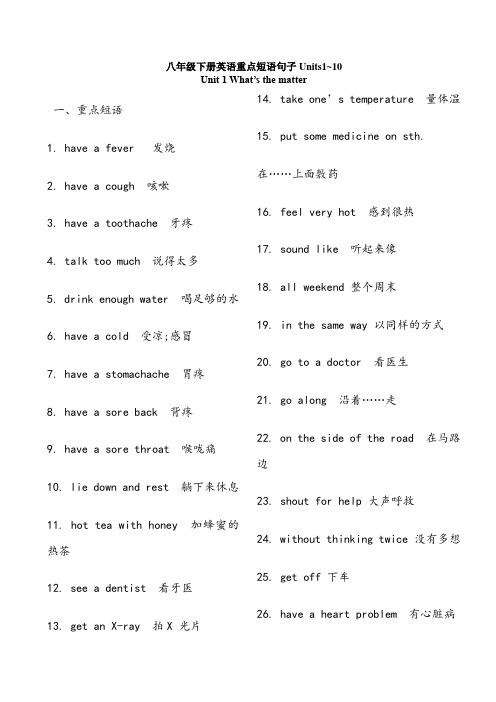
八年级下册英语重点短语句子Units1~10 Unit 1 What’s the matter一、重点短语1. have a fever 发烧2. have a cough 咳嗽3. have a toothache 牙疼4. talk too much 说得太多5. drink enough water 喝足够的水6. have a cold 受凉;感冒7. have a stomachache 胃疼8. have a sore back 背疼9. have a sore throat 喉咙痛10. lie down and rest 躺下来休息11. hot tea with honey 加蜂蜜的热茶12. see a dentist 看牙医13. get an X-ray 拍X 光片14. take one’s temperature 量体温15. put some medicine on sth. 在……上面敷药16. feel very hot 感到很热17. sound like 听起来像18. all weekend 整个周末19. in the same way 以同样的方式20. go to a doctor 看医生21. go along 沿着……走22. on the side of the road 在马路边23. shout for help 大声呼救24. without thinking twice 没有多想25. get off 下车26. have a heart problem 有心脏病27. to one’s surprise 使....... 惊讶的28. thanks to 多亏了;由于29. in time 及时30. save a life 挽救生命31. get into trouble 造成麻烦32. right away 立刻;马上33. because of 由于34. get out of 离开;从……出萍35. hurt oneself 受伤36. put a bandage on sth. 用绷带包扎37. fall down 摔倒38. feel sick 感到恶心39. have a nosebleed 流鼻血40. cut his knee 割伤他的膝盖41. put her head back 把她的头向后仰42. have problems breathing 呼吸困难43. mountain climbing 登山运动44. be used to doing sth. 习惯做某事45. run out (of) 用完;用尽46. so that 以便47. so. . . that 如此……以至于…48. be in control of 掌管;管理49. in a difficult situation 在闲境屮50. keep on doing sth. 继续或坚持做某事51. make a decision 做出决定52. take risks 冒险53. give up 放弃二、重点句型1. What’ s the matterWhat’ s the matter with you= What’s the trouble with you= What’ s wrong with you你怎么了2. What should she do她该怎么办呢Should I take my temperature我应该量一下体温吗主语+ should/shouldn’t + 动词原形. ..①You should lie down and rest.你应该躺下休息一会儿。
八年级下册英语人教版 重点词汇短语句型总结 晨读手册

Unit 1What's the matter?Section A重点单词1.matter n.问题;事情2.sore adj.疼痛的;酸痛的3.stomachache n.胃痛;腹痛拆分记忆法:stomach+ache4.foot n.脚;足5.neck n.颈;脖子6.stomach n.胃;腹部7.throat n.咽喉;喉咙8.fever n.发烧9.lie v.躺;平躺10.rest v.& n.放松;休息11.cough n.& v.咳嗽12.Xray n.X射线;X光13.toothache n.牙痛拆分记忆法:tooth+ache14.headache n.头痛拆分记忆法:head+ache15.break n.间歇;休息16.hurt v.(使)疼痛;受伤17.passenger n.乘客;旅客18.off ad v.& prep.离开(某处);不工作;从……去掉19.onto prep.向;朝20.trouble n.问题;苦恼21.hit v.(用手或器具)击;打22.herself pron.(she的反身代词)她自己词形变换1.foot—feet(复数)2.stomach—stomachs(复数)3.lie(躺)—lay(过去式)—lying(现在分词)4.hurt—hurt(过去式)5.hit—hit(过去式)6.she(主格)—herself(反身代词)重点短语1.have a cold感冒2.have a stomachache胃痛3.lie down躺下4.take one's temperature量体温5.have a fever发烧6.take breaks(take a break)休息7.get off下车8.to one's surprise使……惊讶的是;出乎……的意料9.right away立即;马上10.talk too much说得太多11.drink enough water喝足够的水12.have a very sore throat嗓子非常疼13.drink some hot tea with honey喝一些加蜂蜜的热茶14.see a dentist看牙医15.get an Xray拍X光片16.put some medicine on…在……上面敷一些药17.feel very hot感到很热18.sound like听起来像19.all weekend整个周末20.in the same way以同样的方式21.go to a doctor看医生22.go along沿着……走23.on the side of the road在路边24.shout for help大声呼救25.without thinking twice没有多想26.have a heart problem患心脏病27.thanks to多亏了;由于28.in time及时29.save a life挽救生命30.get into trouble陷入麻烦31.hurt oneself伤到自己32.fall down落下;摔倒重点句型1.你怎么了?What's the matter with you?=What's the trouble with you?=What's wrong with you?2.她昨天说话太多,并且没喝足够的水。
人教版新目标英语八年级下册英语unit4重点短语和句子分析
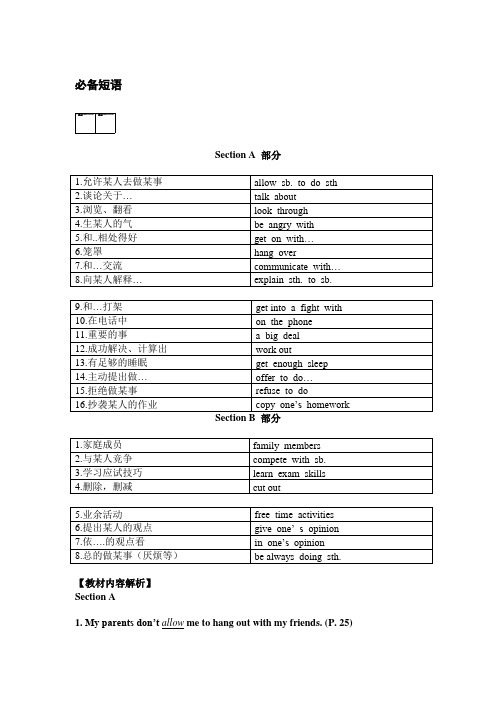
必备短语Section A 部分【教材内容解析】Section A1. My parents don’t allow me to hang out with my friends. (P. 25)① allow doing sth. 允许做某事翻译:The shopkeeper (店员) doesn’t allow smoking in any corner of the shop.__________________________________________② allow sb. to do sth. 允许某人做某事翻译:His parents allow him to play computer games if he finishes his homework. ____________________________________________2. I got into a fight with my best friend. (P. 25)get into a fight with sb.意为“和某人打架”,相当于have a fight with sb.或者fight with sb.。
翻译:He got drunk (醉酒的) and got into a fight with Jim._________________________________________3. What’s wrong? (P. 25)What’s wrong?意为“怎么了?”,用来询问对方有什么问题或者不顺心的事,What’s wrong with...?意为“……怎么了?”,后接sb.或者sth.,用来询问某人或者某物怎么了?---What’s wrong with you, Jim?---I left my umbrella on the bus.【拓展】询问“怎么了?”,主要有以下几种句型:What’s wrong (with sb./sth.)?What’s the matter (with sb./sth.)?What’s the trouble (with sb./sth.)?What’s up (with sb./sth.)?4. I’m really tired because I studied until midnight last night. (P. 25)until表示“直到”和延续性动词连用,意为一个动作一直持续到某个点为止;同短暂性行动连用时,用于“not...until”结构中,表示“直到……才……”。
人教版八年级英语下册第九单元重点短语句子作文

Unit 9 Have you ever been to a museum?一、重点短语1. at night在夜晚 2.in a more natural environment 在一个更加自然的环境中3. all year round一年到头;终年 3. be far from 离……远4.not too far from sp 距离某地不太远5..in the dark 在黑暗中6.. in the past 在过去7.. have been to sp. 去过某地8.. science museum 科学博物馆9. history museum 历史博物馆10.. amusement park 游乐园11.. go somewhere different 去不同的地方12.. go skating 去滑冰13. take the subway 坐地铁14.a great way to spend a Saturdayafternoon一个过周六下午的好方法15. all the old movie cameras所有的古老的电影摄影机16.. learn about sth.解有关….的情况17. on the weekend 在周末18. the Terracotta Army 兵马俑19. lead sb. to do sth.引导某人做某事20. in Southeast Asia在东南亚21.lead to 导致;产生22.take a holiday 度假23.. camp in the mountains24.. Night Safari 夜间动物园在大山里露营25.. more than three quarters of the population 超过四分之三的人口26.. put up a tent搭帐篷27. in such a rapid way 28. an English-speaking country以如此迅猛的方式一个讲英语的国家29.an unusual museum a good place to practice your 一个不寻常的博物馆30.. different kinds of各种各样的一个练习你的英语的好地方31. so many different kinds of toilets .如此不同种类的坐便器32. have problem doing sth.做某事很困难33.development of toilets 厕所的发展34.during the daytime在白天35.. social groups 社会团体36.. a couple of times 好几次encourage sb. to do sth 37. It is the best to do sth. 最好做某事鼓励某人做某事38. one great thing about sp is that……关于某地一个不错的事情是… 39.encourage sb in sth.在某方面鼓励某人40.. the tea art performances茶艺表演choose to do sth.选择做某事41.. a relaxing and peaceful place near a lake 一个休闲而安静的地方42.. thousands of 数以千计的43.. walk around the park在公园四处走44.. International Museum of Toilets国际厕所博物馆45. hear of 听说make notes=take notes 做笔记46. make a perfect cup of tea with beautiful 47. take a ride兜风tea sets用漂亮的茶具沏一杯完美的茶48. another province另一个省49.. a nice place to enjoy tea50.. the Bird’s Nest鸟巢一个品茶的好地方51.. on the one hand... on the other hand.52.right now=at the moment立刻;马上一方面,另一方面53.an amusement park with a special二、重点句型theme 一个特别的主题游乐园1. Have you ever been to... ?Have you ever been to a science museum?你曾经去过科学博物馆吗?2. Let’s.……Let’s go somewhere different today.4我们今天去个不同的地方吧。
人教版八年级下册英语复习 Unit 4 重要短语、句型、重点讲解及作文范文

人教版八年级下册英语 Unit 4重要短语、句型、重点讲解及作文范文Unit 4 Why don’t you talk to your parents?一、重点短语1. have free time有空闲时间2. allow sb. to do sth. 允许某人做某事3. hang out with sb. 与某人闲逛4. after-school classes课外活动课5. get into a fight with sb. 与某人吵架/打架6. until midnight直到半夜7. talk to sb. 与某人交谈8. too many太多9. study too much学得过多10. get enough sleep有足够的睡眠11. write sb. a letter给某人写信12. call sb. up打电话给某人13. surprise sb. 令某人惊讶14. look through翻看15. be angry with sb. 生某人的气16. a big deal重要的事17. work out成功地发展;解决18. get on with不11睦相处;关系良:19. fight a lot经常吵架/打架20. hang over笼罩21. refuse to do sth. 拒绝做某事22. offer to do sth. 主动提出做某事23. so that以便24. mind sb. doing sth. 介意某人做某事25. all the time一直26. in future今后27. make sb. angry使某人生气28. worry about sth. 担心某事29. copy one’s homework抄袭某人的作业30. be oneself做自己31. family members32. spend time alone独自消磨时光33. give sb. pressure给某人施压34. have a fight with sb. 与某人吵架35. compete with sb. 与某人竞争36. free time activities业余活动37. get better grades取得更好的成绩38. give one’s opinion提出某人的观点39. learn exam skills学习应试技巧40. practice sports体育训练41. cause stress造成压力42. cut out删除第1页共12页二、重点句型1. I studied until mid night last night so I didn’t get enough sleep.我昨晚学习到半夜所以睡眠不足。
八年级下册英语知识点最全归纳

八年级下册英语知识点最全归纳Unit 1 短语及句型1.many\\much---- more + 可数或不可数名词更多few --- fewer + 可数名词更多little ----- less +不可数名词更少例如:more people、more pollution、less free time、less pollution、fewer cars、fewer trees2.there will be 将会有 There will be more people.将会有更多的人Will there be less pollution?会有更少的污染吗?Yes,there will.\\ No,there won’t.是,会有。
\\ 不,不会有。
3.be free 免费的4. on computers 在电脑上 on paper 在纸上5.live to be 活到 live to be 200 years old 活到200岁6.fall in love with sb.\\sth. 喜爱某人或某物7.live alone 单独居住8.on vacation 度假9.over and over again 一遍又一遍10.be the same as 与…一样be different from 与…不同unit 2 单词及短语1.What should I \\he\\she\\they\\you do? 我\\他\\她\\他们\\你该怎么办? You could write him a letter. 你可以给他写一封信。
2.argued with sb. 与某人争吵3.out of style 过时的 in style 时尚的4.a ticket to a ball game 一场球赛的票5.surprise sb. 使某人惊奇be surprised at sth. 对…感到惊奇to one’s surprise 令某人惊奇的事6.pay for 支付7.ask sb. for sth. 向某人要求某物ask sb. to do sth. 要求某人做某事8.have a bake sale 烧烤9.find out 发现,查明10.get on well with sb. 与某人相处得好11.have a fight with sb. 与某人争吵、打架12.not……until 直到…才13.it’s time for sth.\\it’s time to do sth. 做某事的时间到了14.under too much pressure 承受太多的压力15.take part in 参加,参与16.a mother of three 三个孩子的妈妈Unit 3 短语及句型1.What were you doing when the UFO arrived?当UFO到达时你在干什么?2.While the boy was walking down the street, the UFO landed. 当男孩在沿着街道走时,UFO降落了3.in front of 在…之前(外部整体前)in the front of (内部整体前)4.talk on the phone 在电话中交谈nd on the street 在街上降落6.walk down the street 沿着街道走7.take off (过去式 took off) 起飞8.around ten o’clock 大约10点9.You can imagine how strange it was!你可以想象它有多奇怪!10.Museum of Flight 飞行博物馆11.jump down 跳下来12.in a tree 在树上 on a tree 长在树上13.run away 跑开,逃跑14.say to sb. 对某人说15.one of the most important events 最重要的事件之一 (one of + 形容词最高级+名词复数)最…之一16.in silence 无声的17.take place 发生(预先安排) happen 发生 (偶然)18.have meaning to sb. 对…来说有意义Unit 4 短语及句型1.He said he was hard-working. 他说他努力学习了2.She said she was having a party for Lana她说她为Lana举行了聚会3.mad at sb. 对某人生气4.first of all 首先5.pass sth. to sb. \\ pass on sth. 传递某物6.be sppoused to 应该7.I’m better at reading than listening. 我的阅读比听力好。
新人教版八年级英语下册Unit2重点短语句型(超全)
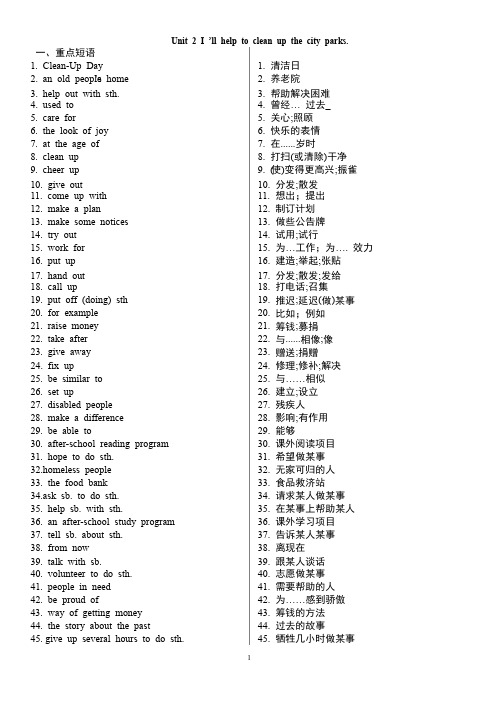
一、重点短语1. Clean-Up Day 2. an old people’s home 3. help out with sth. 4. used to 5. care for 6. the look of joy 7. at the age of 8. clean up 9. cheer up 10. give out 11. come up with 12. make a plan 13. make some notices 14. try out 15. work for 16. put up 17. hand out 18. call up 19. put off (doing) sth 20. for example 21. raise money 22. take after 23. give away 24. fix up 25. be similar to 26. set up 27. disabled people 28. make a difference 29. be able to 30. after-school reading program 31. hope to do sth. 32.homeless people 33. the food bank 34.ask sb. to do sth. 35. help sb. with sth. 36. an after-school study program 37. tell sb. about sth. 38. from now 39. talk with sb. 40. volunteer to do sth. 41. people in need 42. be proud of 43. way of getting money 44. the story about the past 45.give up several hours to do sth. 1. 清洁日2. 养老院3. 帮助解决困难4. 曾经… 过去_ 5. 关心;照顾6. 快乐的表情7. 在......岁时8. 打扫(或清除)干净9. (使)变得更高兴;振雀10. 分发;散发11. 想出;提出12. 制订计划13. 做些公告牌14. 试用;试行15. 为…工作;为…. 效力16. 建造;举起;张贴17. 分发;散发;发给18. 打电话;召集19. 推迟;延迟(做)某事20. 比如;例如21. 筹钱;募捐22. 与......相像;像23. 赠送;捐赠24. 修理;修补;解决25. 与……相似26. 建立;设立27. 残疾人28. 影响;有作用29. 能够30. 课外阅读项目31. 希望做某事32. 无家可归的人33. 食品救济站34. 请求某人做某事35. 在某事上帮助某人36. 课外学习项目37. 告诉某人某事38. 离现在39. 跟某人谈话40. 志愿做某事41. 需要帮助的人42. 为……感到骄傲43. 筹钱的方法44. 过去的故事45. 牺牲几小时做某事46. animal doctor 47. strong feeling of satisfaction 48. book lover 49. decide to 50. at the same time 51. dream come true 52. worry about 53. make money 54. would like to 55. thank sb. for 56. be excited about 57. be satisfied with 58. be surprised (at) 59. special trained dog 60. the idea of 二、重点句型1.这个男孩可以在食品救济站分发食物。
英语人教版八年级下册第五单元短语和句型
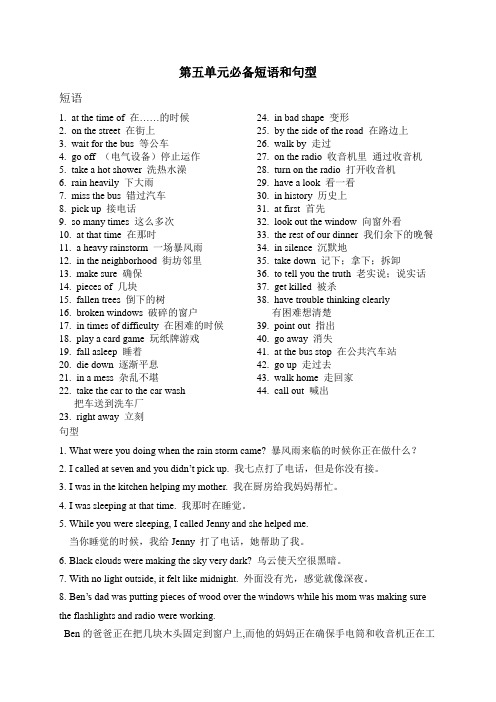
第五单元必备短语和句型短语1. at the time of 在……的时候2. on the street 在街上3. wait for the bus 等公车4. go off (电气设备)停止运作5. take a hot shower 洗热水澡6. rain heavily 下大雨7. miss the bus 错过汽车8. pick up 接电话9. so many times 这么多次10. at that time 在那时11. a heavy rainstorm 一场暴风雨12. in the neighborhood 街坊邻里13. make sure 确保14. pieces of 几块15. fallen trees 倒下的树16. broken windows 破碎的窗户17. in times of difficulty 在困难的时候18. play a card game 玩纸牌游戏19. fall asleep 睡着20. die down 逐渐平息21. in a mess 杂乱不堪22. take the car to the car wash把车送到洗车厂23. right away 立刻24. in bad shape 变形25. by the side of the road 在路边上26. walk by 走过27. on the radio 收音机里通过收音机28. turn on the radio 打开收音机29. have a look 看一看30. in history 历史上31. at first 首先32. look out the window 向窗外看33. the rest of our dinner 我们余下的晚餐34. in silence 沉默地35. take down 记下;拿下;拆卸36. to tell you the truth 老实说;说实话37. get killed 被杀38. have trouble thinking clearly有困难想清楚39. point out 指出40. go away 消失41. at the bus stop 在公共汽车站42. go up 走过去43. walk home 走回家44. call out 喊出句型1.What were you doing when the rain storm came? 暴风雨来临的时候你正在做什么?2.I called at seven and you didn’t pick up. 我七点打了电话,但是你没有接。
新版人教版八年级下册英语1-8各单元重点短语总复习.doc
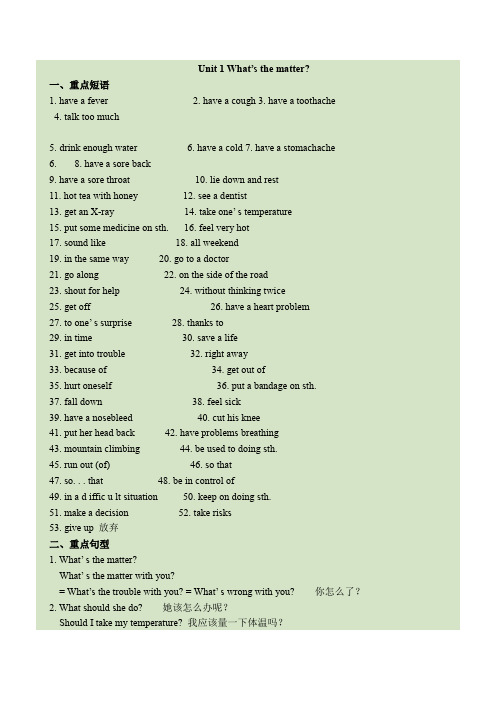
Unit 1 What’s the matter?一、重点短语1. have a fever2. have a cough3. have a toothache4. talk too much5.drink enough water6. have a cold7. have a stomachache6.8. have a sore back9. have a sore throat 10. lie down and rest11. hot tea with honey 12. see a dentist13. get an X-ray 14. take one’ s temperature15. put some medicine on sth. 16. feel very hot17. sound like 18. all weekend19. in the same way 20. go to a doctor21. go along 22. on the side of the road23. shout for help 24. without thinking twice25. get off 26. have a heart problem27. to one’ s surprise 28. thanks to29. in time 30. save a life31. get into trouble 32. right away33. because of 34. get out of35. hurt oneself 36. put a bandage on sth.37. fall down 38. feel sick39. have a nosebleed 40. cut his knee41. put her head back 42. have problems breathing43. mountain climbing 44. be used to doing sth.45. run out (of) 46. so that47. so. . . that 48. be in control of49. in a d iffic u lt situation 50. keep on doing sth.51. make a decision 52. take risks53. give up 放弃二、重点句型1. What’ s the matter?What’ s the matter with you?= What’s the trouble with you? = What’ s wrong with you?你怎么了?2. What should she do? 她该怎么办呢?Should I take my temperature? 我应该量一下体温吗?主语+ should/shouldn’t + 动词原形. ..①You should lie down and rest. 你应该躺下休息一会儿。
新人教版|八年级下册英语所有语法全汇总
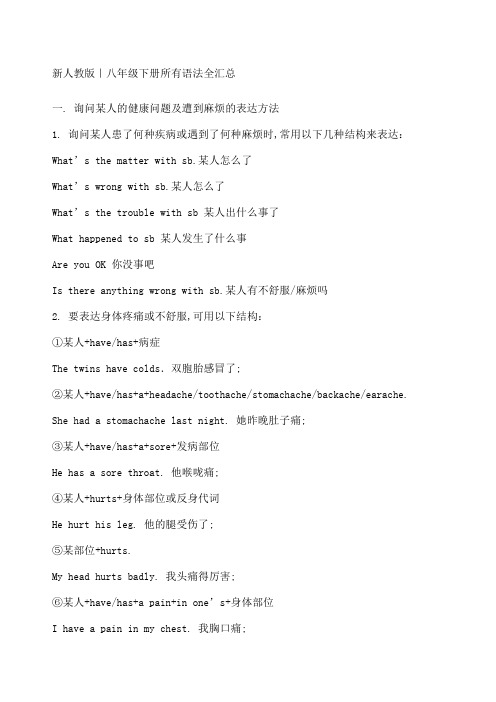
新人教版|八年级下册所有语法全汇总一. 询问某人的健康问题及遭到麻烦的表达方法1. 询问某人患了何种疾病或遇到了何种麻烦时,常用以下几种结构来表达:What’s the matter with sb.某人怎么了What’s wrong with sb.某人怎么了What’s the trouble with sb 某人出什么事了What happened to sb 某人发生了什么事Are you OK 你没事吧Is there anything wrong with sb.某人有不舒服/麻烦吗2. 要表达身体疼痛或不舒服,可用以下结构:①某人+have/has+病症The twins have colds.双胞胎感冒了;②某人+have/has+a+headache/toothache/stomachache/backache/earache. She had a stomachache last night. 她昨晚肚子痛;③某人+have/has+a+sore+发病部位He has a sore throat. 他喉咙痛;④某人+hurts+身体部位或反身代词He hurt his leg. 他的腿受伤了;⑤某部位+hurts.My head hurts badly. 我头痛得厉害;⑥某人+have/has+a pain+in one’s+身体部位I have a pain in my chest. 我胸口痛;⑦There is something wrong with one’s+身体部位There is something wrong with my right eye. 我的右眼有毛病;⑧其他表达方式She has a heart trouble. 她有心脏病;He got hit on the head. 他头部受到了撞击;She cut her finger. 她割破手指了;二. 情态动词should的用法1. should为情态动词,意为“应该;应当”,否定式为shouldn’t,其后接动词原形,无人称和数的变化;常用来表示征询意见、建议、劝告、要求或义务等;You should drink more water. 你应该多喝水;He should put his head back. 他应该把头后仰;We should try our best to help him. 我们应当尽力去帮助他; You shouldn‘t watch TV. 你不应该看电视;2. should用于主语为第一人称的疑问句,表示征询意见;Should I put some medicine on it 我应当给它敷上药吗Should we tell her about it 我们应该告诉她这件事吗3. 在英语中,表示建议的说法有很多,而且都是中考考查的重点;主要结构有:①Would you like to do sth你想要/愿意做某事吗Would you like to play basketball with me 你想要和我一起打篮球吗②Shall I/we do sth 我/我们做某事好吗Shall we go to the zoo tomorrow 明天我们去动物园,好吗③Why not do sth 为什么不......呢Why not join us为什么不加入到我们当中来呢④How/What about doing sth 做某事怎么样How about going swimming 去游泳怎么样⑤Let’s do sth. 让我们做......吧;Let’s go home. 咱们回家吧;⑥You’d better not do sth 你最好不要做某事;You’d better not go there alone. 你最好不要一个人去那儿;三. 反身代词英语中共有八个反身代词,在使用时应注意和它所指的相应的对象在人称、性别和数上保持一致;第一人称第二人称第三人称单数 myself yourself himself/herself/itself复数 ourselves yourselves themselves反身代词的用法1. 可用作宾语,指的是宾语和主语表示同一个或同一些人或事物;如:Maria bought herself a scarf.We must look after ourselves very well.2. 可用作表语,指的是表语和主语表示同一个或同一些人或事物;如: She isn’t quite herself today.3. 可用作主语或宾语的同位语,常用来加强语气;如:She herself will fly to London tomorrow.I met the writer himself last week.4. 用在某些固定短语当中;如:look after oneself / take care of oneself 照顾自己teach oneself sth./learn sth. by oneself 自学enjoy oneself 玩得高兴,过得愉快help oneself to sth 请自用……随便吃/喝些……hurt oneself 弄伤自己say to oneself 自言自语leave sb. by oneself 把某人单独留下注意反身代词不能单独做主语,但可以做主语的同位语,起强调作用;如:我自己能完成作业;误Myself can finish my homework.正I myself can finish my homework. / I can finish my homework myself.四. 一般将来时一般将来时表示将来某个时间要发生的动作或状态,或将来经常发生的动作或状态;一般将来时的基本结构1. will+动词原形否定式:will not=won't一般疑问式:will/shall+主语+动词原形+其他特殊疑问式:特殊疑问词+一般疑问式—Will he help you with your English tonight今天晚上他会帮助你学习英语吗—Yes, he will./No, he won't.是的,他会;/不,他不会;—When will you arrive for America你什么时候去美国—Tomorrow.明天;2. am/is/are going to +动词原形否定式:am/is/are not going to +动词原形一般疑问式:am/is/are +主语+ going to + 动词原形+其他特殊疑问式:特殊疑问词+一般疑问式Look at the dark clouds. There is going to be a storm.看那乌云,快要下雨了;Is he going to collect any data for us他会帮我们收集数据吗What are you going to do tomorrow明天你打算作什么3. will+动词原形与am/is/are going to +动词原形的用法区别will+动词原形与am/is/are going to +动词原形的用法虽然都表示将来发生动作或情况,一般情况下能互换;但它们的用法是有区别的;will主要用于在以下三个方面:1表示主观意愿的将来;They will go to visit the factory tomorrow.明天他们将去厂参观工厂;2表示不以人的意志为转移的客观的将来;He will be thirty years old this time next year.明年这个时候他就将三十岁;3表示临时决定,通常用于对话中;—Mary has been ill for a week.玛丽病了一周了;—Oh, I didn't know. I will go and see her.噢,我不知道;我去看看她;be going to主要用于以下两个方面:1表示事先经过考虑、安排好打算、计划要做某事;Dad and I are going to watch an opera this afternoon.今天下午我和爸爸打算去看歌剧;2表示根据目前某种迹象判断,某事非常有可能发生,表示推测;Look There come the dark clouds. It is going to rain.瞧乌云密集;天要下雨了;五. 动词不定式to do的用法1. 作主语为避免句子的头重脚轻,常用it作为形式主语,而真正的主语动词不定式后置; 常用句型:It +be+adj./n.+for/of sb. to do sth./It takes sb. some time to do sth.2. 作宾语动词want, decide, hope, ask, agree, choose, learn, plan, need, teach, prepare常接动词不定式作宾语;3. 作后置定语常用于“have/has+sth.+to do”或“Its time to do sth.”等结构中;4. 作宾语补足语tell, ask, want, invite, teach, like, call等可接带to的动词不定式作宾语补足语,构成tell/ask/want /call/invite sb. to do sth.结构;注意动词不定式作使役动词和感官动词的宾语补足语时应省去to:“一感feel,二听listen to, hear,三让let, make, have,四看look at, see, watch, notice,半帮助help”;5. 动词不定式作状语主要用来修饰动词,表示目的,结果或原因;为了强调目的,有时可以把动词不定式放在句首,或在不定式前加in order to 或so as to “为了,目的是”;六. Could you please...句型1. 请求别人时通常用此句型,也可以说Can you...please情态动词could或can 在这里均表示请求,在意思上无区别,但是用could在于其显得更委婉、客气、诚恳;在日常生活中常使用could you/I...若在句末加上please,则显得更礼貌; Could you help me find my book, please你能帮我找到我的书吗2. 对could you/I...的问句作出肯定回答,常用“sure/certainly/of course”等;如果作否定回答,常用“sorry或oh, please don’t”; 一般不用no开头,用no显得语气生硬、不礼貌;3. 表示请求的其他句式Would you like to do...Would you mind doing...Let’s do....Please do...祈使句前加please七. 过去进行时1. 基本概念:过去进行时表示在过去某一时刻或一段时间内正在进行的动作;这一特定的过去时间除有上下文暗示以外, 一般用时间状语来表示;常用的时间状语this morning, the whole morning, all day yesterday, from nine to ten last evening, when, while等;We were watching TV from seven to nine last night.昨天晚上七点到九点的时候我们在看电视;It was raining when they left the station.他们离开车站的时候天正在下雨;2. 基本结构 was / were not + 动词-ing3. 一般过去时与过去进行时用法的比较一般过去时表示在过去某个时间发生过的动作或存在的状态, 而过去进行时则表示在过去某一时刻或某一段时间正在进行的动作;David wrote a letter to his friend last night. 大卫昨晚给他的朋友写了封信;信写完了;David was writing a letter to his friend last night. 大卫昨晚一直在给他的朋友写信;信不一定写完;八. 状语从句1. unless引导条件状语从句unless = if...not... 除非,若不They will go tomorrow unless it rains.= They will go tomorrow if it doesn’t rains.2. as soon as引导时间状语从句,意为“一...就...”;He will come and see you as soon as he can.3. so...that...引导结果状语从句句型1:主语+谓语+so+形容词/副词+that从句The wind was so strong that we could hardly move forward. 句型2: so +形容词 + a/an + 单数名词 + that从句It was so hot a day that they all went swimming.句型3. so + many/ few + 复数名词 + that从句He has so few friends that he often feels lonely.句型4: so +much/ little + 不可数名词 + that 从句I had so little money that I couldn’t buy a pen.九. 形容词/副词的比较等级形容词和副词有三个比较等级,即原级也就是原形、比较级表示“较……”或“更……”的意思,用于两者之间比较和最高级表示“最……”的意思,用于三者或三者以上的比较;1. 形容词/副词的比较级和最高级的规则变化1单音节词和少数以-er,-ow结尾的双音节单词,比较级在后面加-er,最高级在后面加-est;①单音节单词small→smaller→smallestshort→shorter→shortesttall→taller→tallestgreat→greater→greatest②少数以-er,-ow结尾的双音节单词clever→cleverer→cleverestnarrow→narrower→narrowest2以不发音e结尾的单音节单词,比较级在原形后加-r,最高级在原级后加-st; large→larger→largestnice→nicer→nicestable→abler→ablest3以一个辅音字母结尾的闭音节即:辅音+元音+辅音单词中,先双写末尾的辅音字母,比较级加-er,最高级加-est;big→bigger→biggesthot→hotter→hottestfat→fatter→fattest4以“辅音字母+y”结尾的双音节词, 把y改为i,比较级加-er,最高级加-est; easy→easier→easiestheavy→heavier→heaviestbusy→busier→busiesthappy→happier→happiest5其他双音节词和多音节词,比较级在前面加more,最高级在前面加most; beautiful→more beautiful→most beautifuldifferent→more different→most differenteasily→more easily→most easily2. 形容词/副词的比较级和最高级的不规则变化good→better→bestwell→better→bestbad→worse→worstill→worse→worstold→older/elder→oldest/eldestmany/much→more→mostlittle→less→leastfar →further/farther→ furthest/farthest3. 原级常用句型1A is as+原级+ as+ B 表示A与B一样...eg. He is as tall as me.2A is not as/so +原级+ as B 表示A不如B...eg. He is not as tall as me.3只能修饰原级的词,very,quite,so,too,so,enough,pretty等 ; eg. He is too tired to walk on.他太累了以至于不能再继续走了;4. 比较级常用句型1当句中有than时则用比较级;eg. He is fatter than me.2“特殊疑问词+be+形容词比较级,A or B ”eg. Which is bigger,the earth or the moon哪一个更大,地球还是月球3“比较级+and+比较级”表示“越来越...”;eg. The flowers are more and more beautiful.花儿越来越漂亮;English is more and more important. 英语越来越重要了;4“the+比较级,the+比较级”表示“越...,越...”;eg. The more careful you are,the fewer mistakes you’ll make.5可以修饰比较级的词:much,a lot,far,a little,a bit,even,still等;eg. Lesson One is much easier than Lesson Two. 第一课比第二课容易得多;5. 最高级常用句型1.“主语+be+the+形容词最高级+单数名词+in/of...”表示“……是……中最……的”;Tom is the tallest in his class/of all the students.汤姆是他们班上/所有学生当中最高的;2.“主语+实意动词+the+副词最高级+in/of...”表示“……是……中最……的”;I jump the farthest in my class.我是我们班跳得最远的;3.“主语+be+one of the+形容词最高级+复数名词+in/of...”表示“……是……中最……之一”;Beijing is one of the largest cities in China.北京是中国最大城市之一;4.“特殊疑问词+be+the+最高级,甲,乙,or丙”用于三者或三者以上的比较; Which country is the largest,China,Brazil or Canada哪个国家最大,中国,巴西还是加拿大5.“特殊疑问词+助动词+主语+the+副词最高级+甲,乙,or丙”用于三者或三者以上的比较;Which season do you like the best,spring,summer or autumn你最喜欢哪一个季节,春天,夏天还是秋天注意:副词最高级用在句中时,其前可以加the,也可以不加;但形容词最高级用在句中时,其前一般都要加the;十. 现在完成时一. 现在完成时基本结构①肯定句:主语+have/has+动词的过去分词②否定句:主语+have/has+not+动词的过去分词③一般疑问句:Have/Has+主语+动词的过去分词④特殊疑问句:特殊疑问词+一般疑问句have/has+主语+过去分词二. 现在完成时用法1. 现在完成时用来表示过去已经完成的动作对现在造成影响或后果;也就是说,动作或状态发生在过去但它的影响现在还存在,强调的是现在;I have already posted the photo.我已经邮寄出了照片;与此种用法连用的时间状语时一些模糊的过去时间状语,如already肯定句, yet 否定句/疑问句, just, before, recently,still, lately,never等;2. 现在完成时也可用来表示动作或状态发生在过去某一时刻,持续到现在并且有可能会继续持续下去;He has lived here since 1978.自从1978年以来,他一直住在这儿;动作起始于1978年,一直住到现在,可能还要继续住下去;此种用法常与for+时间段,since+时间点或过去时的句子连用;谓语动词必须是延续性动词;有些瞬间动词可变为延续动词:go out----be outfinish----be overopen----be opendie----be deadbuy---havefall ill---be illcome back----be backcatch a cold----have a cold。
人教版八年级英语下册单词-短语-句型和语法总结

⼈教版⼋年级英语下册单词-短语-句型和语法总结Unit1What’s the matter?【重点单词】matter [?m?t?] v.重要,要紧,有关系What’s the matter? 怎么了?出什么事了?sore [s?:(r)] adj. 疼痛的,酸痛的have a cold感冒stomach ['st?m?k]n. 胃,腹部stomachache ['st?m?ke?k] n.胃痛,腹痛have a stomachache 胃痛foot(复数feet) [fu:t] n. 脚neck [nek] n.颈,脖⼦throat[θr??t] n.喉咙fever ['fi:v?]n. 发烧,发热lie [la?]v. 躺,平躺lie down躺下rest [rest] n. 剩余部分,其余;放松,休息cough [k?f] n. & v.咳嗽X-ray ['eksre?] n.X光,X射线toothache[?tu:θe?k] n. ⽛痛takeone's temperature 量体温headache [?hede?k] n.头痛have a fever发烧break [bre?k] n. &v. 休息,暂停;打破take breaks (take a break) 休息hurt [h?:t] v.伤害,损害,使受伤passenger ['p?s?nd??]n. 乘客,旅客off[?f] adv. prep.离开(某处);从…去掉get off 下车to one's surprise 使…惊讶,出乎…意料onto [??nt?]prep. 向,朝trouble[?tr?bl] n. ⿇烦,烦扰,问题hit [hit] n. & v.碰撞,打,打击right away ⽴即,马上get into陷⼊,参与herself [h?:?self]pron.她⾃⼰,她本⾝(she的反⾝代词)bandage ['b?nd?d?]n.& v. 绷带;⽤绷带包扎sick [s?k] adj.患病的,不适的knee [ni:] n.膝盖nosebleed [?n??zbli:d]n. ⿐出⾎breathe [bri:e] v.呼吸sunburned[?s?nb?:nd] adj. 晒伤的ourselves[ɑ:?selvz] pron. 我们⾃⼰(we的反⾝代词)climber [?kla?m?(r)] n. 登⼭者be used to 习惯于… 适应于…risk[r?sk] n. &v. 风险,危险;冒险take risks (take a risk)冒险accident [??ksid?nt] n. 意外事件;事故situation [?sitju?ei??n] n. 状况,形式,情况kg=kilogram[?k?l?gr?m]n.公⽄,千克rock[r?k] n. 岩⽯run out (of) ⽤尽,耗尽knife [naif] n.⼑,餐⼑cut off 切除blood [bl?d] n. ⾎mean [mi:n] v. 意味着,意思是,意欲get out of离开,从… 出来importance [?m?p?:tns] n. 重要性decision [d?'s??n] n. 决⼼,决定,抉择control [k?n'tr??l] v.控制,⽀配,操纵be in control of 掌管,管理spirit['sp?r?t] n.勇⽓,意志death [deθ] n.死亡give up放弃nurse [n?:s]n. 护⼠【重点短语】1.have a fever 发烧2.havea cough咳嗽3.have atoothache⽛疼4.talk too much 说得太多5.drink enoughwater喝⾜够的⽔6.have a cold 受凉;感冒7.have a stomachache胃疼8.have asore back背疼9.have a sore throat喉咙痛10. take risks冒险11.hot teawith honey加蜂蜜的热茶12.see a dentist 看⽛医13.get an X-ray 拍X 光⽚14.takeone’ s temperature量体温15.putsomemedicine onsth. 在……上⾯敷药16.give up 放弃17. sound like听起来像18.all weekend 整个周末19. in the same way 以同样的⽅式20. go to a doctor 看医⽣21. goalong沿着……⾛22. on thesideofthe road 在马路边23. shout for help⼤声呼救24. without thinking twice没有多想25. get off 下车26. have a heart problem 有⼼脏病27. toone’ s surprise另某⼈惊讶的是28.thanksto 多亏了;由于29. in time 及时30.makea decision 做出决定31. get into trouble造成⿇烦32.right away⽴刻;马上33. becauseof由于34. getout of 离开;从……出来35. keep on doing sth. 继续或坚持做某事36.put abandage on sth. ⽤绷带包扎37.fall down 摔倒38. feel sick 感到恶⼼39. have a nosebleed流⿐⾎40.cuthis knee割伤他的膝盖41. put her head back把她的头向后仰42.have problems breathing 呼吸困难43. mountain climbing登⼭运动44. be used to doing sth.习惯做某事45. run out(of) ⽤完;⽤尽46. so that 以便47. so...that... 如此……以⾄于...…48. be in control of 掌管;管理49. in a difficult situation 在闲境中【重点句型】1. What's the matter with you?=What'the trouble with you?= What's wrong with you? 你怎么了?2. What should she do? 她该怎么办呢?3.Should I take my temperature?我应该量⼀下体温吗?4.You should lie down and rest.你应该躺下休息⼀会⼉。
人教版八年级英语下册各单元知识点汇总
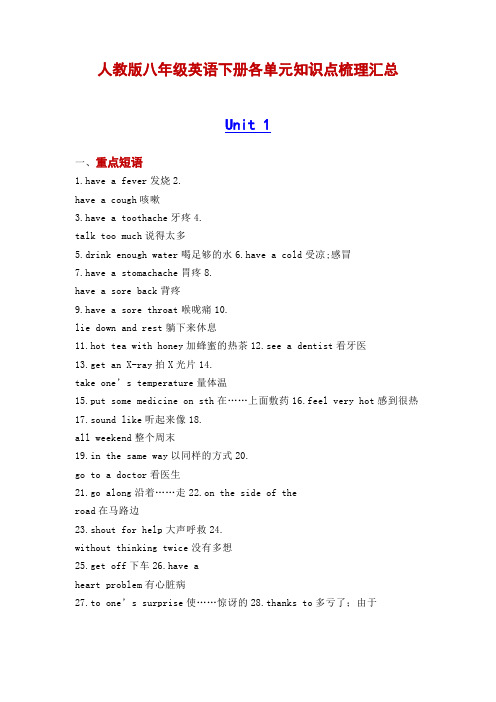
人教版八年级英语下册各单元知识点梳理汇总Unit 1一、重点短语1.have a fever发烧2.have a cough咳嗽3.have a toothache牙疼4.talk too much说得太多5.drink enough water喝足够的水6.have a cold受凉;感冒7.have a stomachache胃疼8.have a sore back背疼9.have a sore throat喉咙痛10.lie down and rest躺下来休息11.hot tea with honey加蜂蜜的热茶12.see a dentist看牙医13.get an X-ray拍X光片14.take one’s temperature量体温15.put some medicine on sth在……上面敷药16.feel very hot感到很热17.sound like听起来像18.all weekend整个周末19.in the same way以同样的方式20.go to a doctor看医生21.go along沿着……走22.on the side of theroad在马路边23.shout for help大声呼救24.without thinking twice没有多想25.get off下车26.have aheart problem有心脏病27.to one’s surprise使……惊讶的28.thanks to多亏了;由于29.in time及时30.save a life挽救生命31.get into trouble造成麻烦32.right away立刻;马上33.because of由于34.get out of离开35.hurt oneself受伤36.put a bandage on sth.用绷带包扎37.fall down摔倒38.feel sick感到恶心39.have a nosebleed流鼻血40.cut his knee割伤他的膝盖41.put her head back把她的头向后仰42.have problems breathing呼吸困难43.mountain climbing登山运动44.be used to doing sth.习惯做某事45.run out(of)用完;用尽46.so that以便47.so…that如此……以至于……48.be in control of掌管;管理49.in a difficult situation在逆境屮50.keep on doing sth.坚持做某事51.make a decision做出决定52.take risks冒险53.give up放弃二、重点句型1.You need to take breaks away from the computer.你需要远离电脑,休息一下。
人教版八年级英语下册Unit8知识点归纳

Unit8 Have you read Treasure Island yet?知识点归纳一、重点短语1. on page 25 在第2 5 页2. the back of the book 书的背面3. hurry up 赶快;匆忙4. in two weeks 在两周之内5. go out to sea 出海6. an island full of treasures 一个满是宝藏的岛屿7. w rite about 写作关于……的内容8. finish doing sth. 做完某事9. wait for another ship 等待另一艘船到来10. learn to do sth. 学会做某事11. grow fruits and vegetables 种水果和蔬菜12. a few weeks ago 几个星期前13. the marks of another man’ s feet另一个人的脚印14. not long after that 不久之后15. run towards sp. 跑向某地16. use... to do sth. 用……来做某事17. signs left behind by someone 某人留下的标记18. read the newspaper 看报19. science fiction 科幻小说20. can’ t wait to do sth. 迫不及待地做某事21. a good way to wake up 醒来的一个好办法22. number of people 人数23. used to do sth. (过去)常常做某事24. study abroad 在国外学习25. make sb. do sth. 使某人做某事26. come to realize 开始意识到27. ever since then 自从那时起28. the southern states of America美国的南部地区29. belong to 属于30. be kind to each other 善待彼此31. trust one another 互相信任32. the beauty of nature 大自然的美33. have been to sp. 去过某地34. do some research on sth. 对……做研究35. hope to do sth. 希望做某事36. see sb. do sth. 看到某人做某事37. the first line in the song歌曲的第一行38. enjoy success in享受……的成功39. at the end of the day 傍晚的时候二、用法归纳1.finish doing sth 完成做某事2.arrive at/in sw 到达某地3.learn to do sth 学习做某事4.see sb doing sth 看到某人正在做某事 sb sth 给某人取名为.......6.teach sb sth 教某人某事e sth to do 用某物做某事8.love to do/doing sth 喜欢做某事9.can’t wait to do sth 迫不及待做某事10.b e kind to sb 对某人友好11.h ope to do sth 希望做某事12.h ave time to do sth 有时间做某事13.h ave nothing to do 没什么事情可做三、重点句型1. Have you….. yet?— Have you read Little Women yet?你读过《小妇人》吗?— Yes,I have. /N o, I haven’ t.是的,我读过。
人教版八年级下册英语:Unit 10 重点短语、重点句型、交际用语、语法、书面表达范文汇编(全面!)
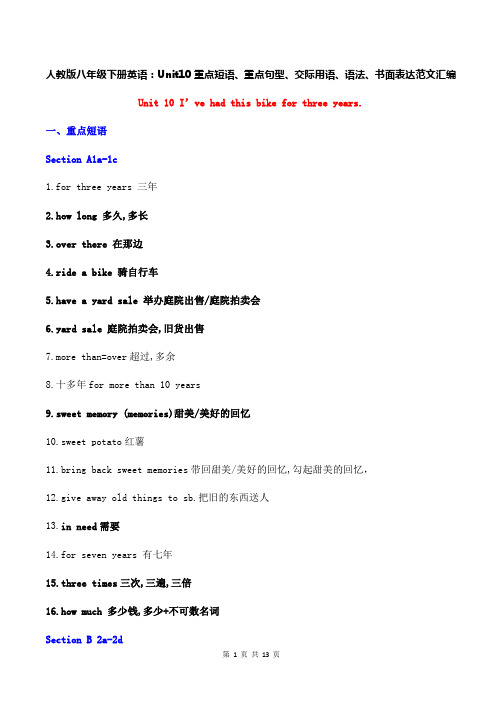
人教版八年级下册英语:Unit10重点短语、重点句型、交际用语、语法、书面表达范文汇编Unit 10 I’ve had this bike for three years.一、重点短语Section A1a-1c1.for three years 三年2.how long 多久,多长3.over there 在那边4.ride a bike 骑自行车5.have a yard sale 举办庭院出售/庭院拍卖会6.yard sale 庭院拍卖会,旧货出售7.more than=over超过,多余8.十多年for more than 10 years9.sweet memory (memories)甜美/美好的回忆10.sweet potato红薯11.bring back sweet memories带回甜美/美好的回忆,勾起甜美的回忆,12.give away old things to sb.把旧的东西送人13.in need需要14.for seven years 有七年15.three times三次,三遍,三倍16.how much 多少钱,多少+不可数名词Section B 2a-2d17.toy bear 玩具熊18.toy lion 玩具狮子19.toy tiger 玩具老虎20.bread maker 面包机21.g ive away 赠送22.not.. anymore=no more 不再…23.not ...any longer=no longer不再24.soft toys 步绒玩具,软体玩具,毛绒玩具25.keep the bear保留玩具熊26.welcome to sp. 欢迎到某地27.the Sunshine Home for Children 阳光儿童之家28.have something for the kids/children有东西送给孩子们29.for a couple of months 有几个月30.a couple of两个,几个,一对31.a bit =a little =a little bit =kind of 有点32.check out 察看,观察,看看33.board games 棋类游戏34.one last thing 最后一件东西35.for a long time 有很长一段时间36.Thanks so much!= Thanks a lot!= Thank you very much!非常感谢,多谢! Section A 3a-3c37.长大grow up38.in junior high school 在上中学/初中39.in a yard sale 在庭院售卖会/旧货出售活动中40.give the money to 把钱捐给......41.a children’s home 儿童之家,孤儿院42.clear out 清理,清理出来,丢掉43.a lot of =many =lots of =a number of 许多,大量44.at first =first of all= to begin with一开始,首先45.许多东西a lot of things46.play with玩耍47.for example/instance 例如48.own a train and railway set 拥有一套火车和铁路轨道的玩具49.every week 每个星期50.toy monkey 玩具猴51.next to 在......旁边52.在猴子旁边next to the monkey53.睡在猴子旁边sleep next to the monkey54.55.every night 每天晚上56.part with放弃,交出,和......分开57.as for me 对我来说,至于我58.as for至于,关于59.give up 放弃60.football shirts足球服,橄榄球衣61.to be honest 说实在的62.for a while 有一段时间63.with the money 用钱64.考虑,思考,认为,想过think about65.even though =even if = although =though 虽然,尽管,即使Section A Grammar Focus-4c66.踢足球play football=play soccer ball67.in Japan 在日本68.three days ago三天前69.有三天for three days70.ten hours ago 十小时以前71.for ten hours有十个小时72.have a camera有一个摄影机/摄像机73.three years ago三年前74.on Monday在星期一75.生病become ill76.water park水上乐园,水上公园77.next month 下个月78.have a dog=keep a dog 饲养狗,养狗79.有一架钢琴have a piano80.from the Li family从/跟李家(买的81.move to the US 搬到美国st year 去年83.be back to =come back to =get back to回到,回来84.f or two years 有两年85.a lot =very much 非常,很,常常86.for over 20 years 20多年87.in this small town 在这个小城里,在这个小镇里Section B 1a-1d88.high school 高中,中学,高级中学89.middle school中学,初级中学90.primary school小学91.live in 居住92.在周末on weekends= on the weekend93.镇图书馆town library94.科学博物馆science museum95.沿街饭店restaurant down the street96.a concert hall音乐厅,歌厅97.for at least 20 years 至少有20年Section B 2a-2d98.(be the same as和......一样)99.(in the passage 在这篇短文里/文章中)lions of 许多,上百万,数百万101.leave the countryside 离开农村/乡村102.每年every year103.how often 多久一次104.hometown feeling家乡情怀105.once or twice a year=one or two times a year一年一到两次106.search for work 找工作107.寻找look for=search for108.in the cities 在城市里,到城市里109.for the last 13 years=for the past three years 在过去的13年里110.with a hard job工作非常辛苦111.in a crayon factory在蜡笔厂112.much time 许多时间113.return home =get back home=come back home=be back home 回家114.at least 至少115.once a year 一年一次116.for almost three years 几乎有三年117.regard with great interest=become interested in=be interested in =take aninterest in 对......感兴趣,以浓厚的兴趣关注着rge hospitals大医院119.build new school建盖新学校120.send teachers from从......派老师来121.......真实的一面be true of122.learn to read and count学会阅读和数数123.20世纪中期the mid-20th century124.always stay the same一成不变,保持老样子125.according to依据;按照126.opposite the school=across from the school学校对面127.become quite a symbol of the place 成为这个地方的象征/标志128.most of the children大多数孩子们129.一起玩play together130.under that big tree 在那棵大树下面131.during the summer holidays在暑假期间132.such a happy childhood多么快乐的童年133.leave many soft and sweet memories 留下许多温柔甜美的回忆134.in one’s heart在某人心目中,在某人心中135.t hese days=now =at present= at the moment 目前;现在136.回到return to137.in close to three years 在近三年在138.几乎,接近close to139.拥有/承载着所有儿时的记忆hold all sb.’s childhoodSection B 3a-Self Check140.把某物给某人give sth. to sb.141.如此,这么,那么,非常so much142.在第一段in the first paragraph143.在第二段in the second paragraph144.对某人很特别/特殊be special to sb.145.在第三段in the third paragraph146.玩电子游戏play computer games147.so far=up to now 迄今;到现在为止,目前为止148.in Beijing在北京149.for about two years 大约有两年150.回到美国be back to the US/the America/the United States/the U.S.A 151.move to China 搬到中国152.去那里go there153.10 years old 十岁154.把……看做regard…as…二、重点句型及知识点Section A 1. I learned how to ride a bike on it.我学会了怎样骑自行车。
人教版八年级下册各单元英语语法解析知识重点总结
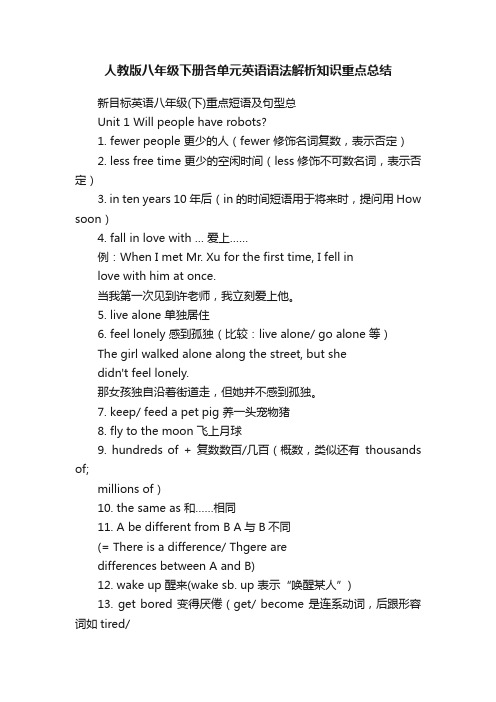
人教版八年级下册各单元英语语法解析知识重点总结新目标英语八年级(下)重点短语及句型总Unit 1 Will people have robots?1. fewer people 更少的人(fewer 修饰名词复数,表示否定)2. less free time 更少的空闲时间(less 修饰不可数名词,表示否定)3. in ten years 10年后(in 的时间短语用于将来时,提问用How soon)4. fall in love with … 爱上……例:When I met Mr. Xu for the first time, I fell inlove with him at once.当我第一次见到许老师,我立刻爱上他。
5. live alone 单独居住6. feel lonely 感到孤独(比较:live alone/ go alone 等)The girl walked alone along the street, but shedidn't feel lonely.那女孩独自沿着街道走,但她并不感到孤独。
7. keep/ feed a pet pig 养一头宠物猪8. fly to the moon 飞上月球9. hundreds of + 复数数百/几百(概数,类似还有thousands of;millions of)10. the same as 和……相同11. A be different from B A与B不同(= There is a difference/ Thgere aredifferences between A and B)12. wake up 醒来(wake sb. up 表示“唤醒某人”)13. get bored 变得厌倦(get/ become 是连系动词,后跟形容词如tired/angry/ excited 等)14. go skating 去滑冰(类似还有go hiking/ fishing /skating/ bike riding 等)15. lots of/ a lot of 许多(修饰可数名词、不可数名词都可以)16. at the weekends 在周末17. study at home on computers 在家通过电脑学习18. agree with sb. 同意某人(的意见)19. I don't agree. = I disagree. 我不同意。
人教版八年级英语下册第二单元重点知识点梳理
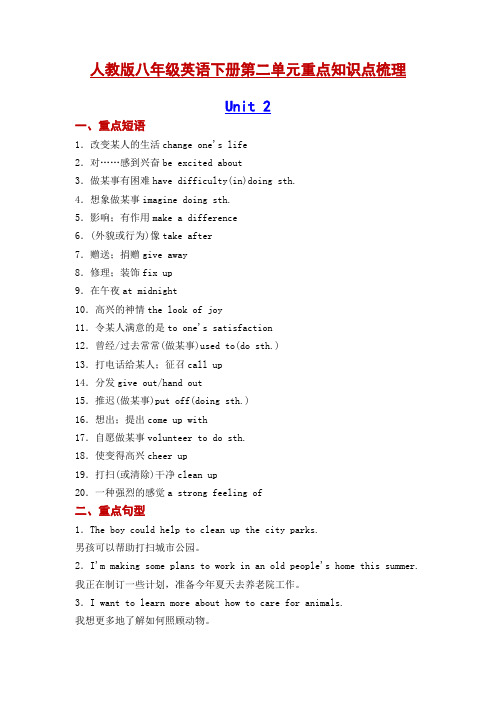
(2)作不及物动词,如:
Something unexpected has turned up.出现了令人意外的情况。
(3)既可作及物动词又可作不及物动词,如:
你的帮助使我拥有Lucky成为可能。
三、重点语法
动词短语
动词短语就是有些动词可以和一些别的词构成短语(以动词为中心),表达一个概念,其作用和一个单独动词差不多的一种固定搭配。在实际使用中,通常会把动词短语当成一个整体。
动词短语有以下常见类型:1. Nhomakorabea词+副词
(1)作及物动词,如:
He brought up his children strictly.
The barrel of gunpowder blew up.(不及物)火药桶爆炸了。
The soldiers blew up the bridge.(及物)士兵们把桥炸毁了。
2.动词+介词
动词与介词构成的词组在词义上相当于一个及物动词,宾语总是在介词后面,如:
I don't care for television.我不很喜欢电视。(care for=like)
3.动词+副词+介词
在这类动词短语中,动词、副词、介词紧密结合,是动副词组和动介词组的合成体,词义上相当于一个及物动词。它兼有以上两类短语动词的特点,但宾语总是位于介词之后,如:
get on/along with(与……相处)catch up with(赶上,跟上)
We must work hard to make up for the lost time.
人教版八年级下英语各单元重点单词短语句型默写

人教版八年级下英语各单元重点单词短语句型默写人教版八年级下英语各单元重点单词短语句型默写目录人教版八年级下英语各单元重点单词短语句型默写 (1)Unit 1 What's the matter? (1)Unit 2 I'll help to clean up the city parks. (2)Unit 3 Could you please clean your room? (4)Unit 4 Why don't you talk to your parents? (5)Unit 5 What were you doing when the rainstorm came? (7) Unit 6 An old man tried to move the mountains. (8)Unit 7 What's the highest mountain in the world? (10) Unit 8 Have you read Treasure Island yet? (11)Unit 9 Have you ever been to a museum? (13)Unit 10 I've had this bike for three years. (14)Unit 1 What's the matter?一、重点单词默写1. 问题;事情_________2. 胃痛_________3. 脚;足_________4. 脖子_________5. 喉晚_________6. 发烧_________7. 咳漱_________ 8. 牙痛_________9. 头痛_________ 10. 间歇;休息_________11. 乘客_________ 12. 问题;苦恼_________13. 她自己_________ 14. 生病的_________15. 膝盖_________ 16. 我们自己_________17. 登山者_________ 18. 危险;冒险_________19. 情况;状况_________ 20. 小刀_________21. 岩石_________ 22. 血_________23. 意思是;打算_________ 24. 重要性;重要_________25. 决定;抉择_________ 26. 限制;约束_________27. 勇气;意志_________ 28. 死;死亡_________29. 护士_________二、重点短语默写1. 喝够水_________2. 说得太多_________3. 喉咙疼_________4. 躺下来休息_________5. 喝蜂蜜热水_________6. 牙疼_________7. 看牙医_________ 8. 量体温_________9. 放些药在上面_________ 10. 躺在路边_________11. 心脏病_________ 12. 期待某人做某事_________13. 让某人惊奇的是_________ 14. 同意做某事_________15. 睡会儿觉_________ 16. 打到头_________17. 习惯做某事_________ 18. 用完了_________19. 继续(做)某事_________ 20. 放弃(做)某事_________三、重点句型默写1. 怎么了?________________________________________________________________ ______________________ 2. Ben怎么了?________________________________________________________________ ______________________ 3. 你发烧了吗?________________________________________________________________ ______________________ 4. 他牙疼吗?________________________________________________________________ ______________________ 5. 她应该怎么办?______________________________________________________________________________________ 6. 我可以在上面放些药吗?________________________________________________________________ ______________________ 7. 你踢球的时候弄伤了自己吗?________________________________________________________________ ______________________ 8. 你应该回家休息。
- 1、下载文档前请自行甄别文档内容的完整性,平台不提供额外的编辑、内容补充、找答案等附加服务。
- 2、"仅部分预览"的文档,不可在线预览部分如存在完整性等问题,可反馈申请退款(可完整预览的文档不适用该条件!)。
- 3、如文档侵犯您的权益,请联系客服反馈,我们会尽快为您处理(人工客服工作时间:9:00-18:30)。
第1页,共4页※※※※※※※※※※※※※※※※※※※※※※※※※※※密 封 线※※※※※※※※※※※※※※※※※※※※※※※※※※※班级: 学号: 姓名:新人教版八年级下册英语重点短语句型Unit1 What’s the matter ?一、重点短语1. have a fever 发烧2. have a cough 咳嗽3. have a toothache 牙疼4. drink enough water 喝足够的水5. have a cold 受凉;感冒6. have a stomachache 胃疼7. have a sore back 背疼8. have a sore throat 喉咙痛9. lie down and rest 躺下来休息 10. hot tea with honey 加蜂蜜的热茶 11. see a dentist 看牙医 12. get an X-ray 拍X 光片 13. take one’ s temperature 量体温 14. sound like 听起来像15. . get off 下车 16 to one’ s surprise 使....... 惊讶的是 17. thanks to 多亏 由于 18. . in time 及时19 get into trouble 造成麻烦 20. . right away 立刻;马上 21because of 由于 22. get out of 离开;从……出来 23. fall down 摔倒 24. be used to doing sth. 习惯做某事 25 run out (of) 用完;用尽 26. so that 以便27. so. . . that 如此… …以至于 28 be in control of 掌管;管理29. make a decision 做出决定 30. take risks 冒险 31. give up 放弃 二、重点句型1. What’ s the matter?/Wh at’ s the matter with you?= What’s the trouble with you? = What’ s wrong with you?你怎么了?I hurt myself 。
我伤到我自己了2. What should she do?她该怎么办呢?主语+ should / shouldn’t + 动词原形. ..①She should lie down and rest.她应该躺下休息一会 ② You shouldn’t go out at night.你晚上不应该出去。
Should I take my temperature?我应该量一下体温吗?3 Do you have a fever ?Yes ,I do /No, I don’t.你发烧了吗?是的/不是Unit 2 I’ll help to clean up the city parks一、重点短语1. an old people’s home 养老院2. help out with sth. 帮助解决困难3. used to 过去常常4. care for 关心;照顾’5. the look of joy 快乐的表情6. at the age of 在...岁时 7 .clean up 打扫 8 cheer up (使)变得高兴;振奋 9. give out 分发;散发 10. come up with 想出;提出11. make a plan 制订计划 12. try out 试用;试行 13. put up 建造;举起;张贴 14. hand out 分发;散发;发给 15. call up 打电话;召集 16. put off 推迟;延迟 17. take after 与......相像;像 18. give away 赠送;捐赠 19. fix up 修理;修补;解决 20. be similar to 与……相似 21. set up 建立;设立 22. disabled people 残疾人 23. make a difference 影响;有作用 24. be able to 能够 二、重点句型I’d like to help homeless people.我想要去帮助无家可归的人们 I hope to work outside.我希望去外面工作We need to come up with a plan and we can’t p ut off making a plan. She decided to put up signs around the school 她决定去学校周围张贴告示I want to travel alone 我想独自旅行(alone 单独的;lonely 孤独的,表示精神上的) She is sad. Let’s cheer her up 她很伤心,让我们去使她高兴起来吧动词加副词构成的动词短语,代词需要放其中间:fix it up ,give them away ,cheer him upUnit3 Could you please clean your room ?一、重点短语1 get a ride 搭便车2 work on 从事3 finish doing sth. 完成做某事4 do the dishes 洗餐具5 take out the rubbish 倒垃圾6 fold your/the clothes 叠衣服7 sweep the floor 扫地8 make your/the bed 整理床铺9 no problem 没问题 10 take sb. for a walk 带某人去散步 11 all the time 一直;总是 12 do housework /chores 做家务 13 in surprise 惊讶地 14 hang out with sb 和某人一起闲逛 15 lend sb sth.把某物借给某人 borrow sth from sb 向某人借某物16 hate doing /to do sth.讨厌做某事 17 help sb. (to ) d o /with sth 帮助某人干某事 18 invite sb. to do sth 邀请某人做 19 make sb. do sth. 使某人做某事 20 enough stress 足够的压力 21a waste of time 浪费时间 22 in order to 为了 23 get good grades 取得好成绩 24 mind doing sth. 介意做某事 25 depend on 依赖;依靠26 as soon as 一…就 27 look after/take care of 照顾;照看 二、重点句型Could you please clean your room?你能打扫一下你的房间吗?第2页,共4页※※※※※※※※※※※※※※※※※※※※※※※※※※※密 封 线※※※※※※※※※※※※※※※※※※※※※※※※※※※班级: 学号: 姓名:Sure /OK /Certainly /Yes, I can.(肯定回答)No /Sorry ,I can’t 。
I have to do my homework.( 否定回答 )Could I go out for dinner ?Sure ,you can( 我可以出去吃晚饭吗?当然可以)For one week, she did not do any housework and neither did I.整整一周,她什么家务活都不干了,我也一样(当前句表示否定的时候,后面表示与原句一样则用neither 加助动词或者be 动词或者情态动词再加主语,前句表示肯定则用so ) the+比较级, the+比较级 表示越…就越…Unit 4 Why don’t you talk t o your parents ?一、重点短语1. allow sb. to do sth.允许某人做某事2. too much homework 太多的作业(too much 后加不可数名词much too 后加形容词“太”)3. too many classes 太多的课程(too many 加可数名词复数)4. get into a fight with sb./have a fight with sb.与某人吵架/打架5. get enough sleep 有足够的睡眠6. look through 浏览7. be angry with sb. 生某人的气8. a big deal 重要的事9. work out 成功地发展;解决 10. get on with 和睦相处 11. refuse to do sth.拒绝做某事 12. offer to do sth.主动提出做某事 13. all the time 一直 14. worry about sth.担心某事 15. compete with sb.与某人竞争 16. cut out 删除 17. communicate with sb 与某人交流18. It’s time for sth /It’s time to do sth 是该做…的时候了19. compare with 和…做比较 20. in one’s opinion 依某人的观点来看 二、重点句型1 Why don’t you forget about it ? 你为什么不忘掉它呢?(Why don 't you /why not 后接动词原形,表示“为什么不…”)2 Although she’s wrong, it’s not a big deal.虽然她错了,但这并不是什么大事儿(although“虽然”不能与but 连用)3 I studied until midnight last night so I did n’t get enough sleep.我昨晚学习到半夜所以睡眠不足。
(until“直到”通常与not 连用,即not…until“直到…才”)4 He should talk to his friend so that he can say he’s sorry.他应该跟朋友谈谈以便他能说声对不起。
(so that“以便”)Unit 5 what were you doing when the rainstorm came ?一、重点短语1.make sure 确信;确认2. fall asleep 入睡3. die down 逐渐变弱;逐渐消失4. wake up 醒来5. in a mess 一团糟6. go off (闹钟)发出响声7. pick up 接电话8. by the side of the road 在路边9. walk by 走路经过 10. make one’s way to 前往 11. have a look 看一看 12. for example 例如13. be killed 被杀害(be 动词加动词的过去分词表被动) 14. in silence 沉默;无声 15. take down 拆除;摧毁 16. at first 首先17.because of 由于(后接代词,动词ing ,短语。
